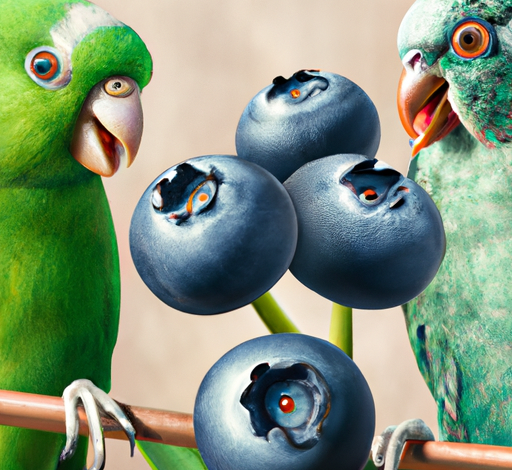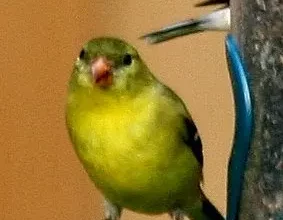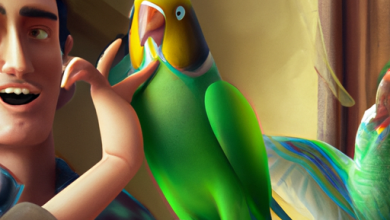Can Quaker Parrots Eat Blueberries?

What Nutrients Do Blueberries Provide for Quaker Parrots?
Blueberries are a nutrient-rich food source for Quaker parrots, providing essential vitamins and minerals that are important for their overall health and wellbeing. Blueberries are a good source of vitamin C, dietary fiber, manganese, and other essential vitamins and minerals. Vitamin C is important for the development of bones, teeth, and feathers, while dietary fiber aids in digestion and helps to keep the digestive system healthy. Manganese is a trace mineral that helps to strengthen the immune system and helps to protect against infection.
Blueberries are also a good source of antioxidants, which help to protect cells from damage caused by free radicals. The antioxidants found in blueberries can help to reduce inflammation and protect against certain types of cancer. Blueberries are also high in polyphenols, which are compounds that have been shown to help reduce the risk of cardiovascular disease.
Blueberries are also a good source of potassium, which is important for maintaining healthy blood pressure levels. Potassium helps to regulate fluid balance in the body and can help to reduce the risk of stroke and heart attack.
In addition to these nutrients, blueberries are also a good source of magnesium, which is important for nerve and muscle function. Magnesium helps to regulate blood sugar levels and can help to reduce stress levels.
Overall, blueberries are an excellent source of essential vitamins and minerals that are important for the health and wellbeing of Quaker parrots. They provide a
How Should Blueberries Be Prepared for Quaker Parrots?
Quaker parrots, also known as Monk parakeets, are a popular pet bird species due to their intelligence, sociability, and ability to mimic human speech. They are also omnivorous, meaning they can eat both plant and animal matter. As such, it is important to provide them with a balanced diet that includes both fruits and vegetables. Blueberries can be an excellent addition to a Quaker parrot’s diet, as they are a great source of vitamins and minerals. However, it is important to prepare blueberries for Quaker parrots in the correct way in order to ensure their safety and health.
When preparing blueberries for Quaker parrots, it is important to make sure that they are washed thoroughly. This will help to remove any dirt or bacteria that may be present on the berries. It is also important to check the blueberries for any signs of mold or decay, as these can be dangerous for birds to consume. If any mold or decay is present, the berries should be discarded.
Once the blueberries have been washed and checked for any signs of spoilage, they should be cut into small pieces. This will make them easier for the Quaker parrot to eat and digest. It is important to avoid cutting the blueberries too small, as this can make them difficult for the bird to pick up and swallow.
It is also important to consider how the blueberries will be served. Quaker parrots
What Are the Benefits of Feeding Blueberries to Quaker Parrots?
Blueberries are a highly nutritious and delicious treat for Quaker parrots. They are packed with antioxidants, vitamins, and minerals that can help promote the overall health of these birds. Feeding blueberries to Quaker parrots can provide numerous benefits, including improved digestion, better vision, and enhanced immunity.
Digestive Health: Blueberries contain dietary fiber, which helps to improve digestion in Quaker parrots. Fiber helps to keep the digestive system functioning properly and can reduce the risk of digestive issues such as constipation. Additionally, blueberries are rich in antioxidants, which can help to reduce inflammation in the gut and protect against digestive disorders.
Vision: Blueberries are a great source of vitamin A, which is essential for healthy eyesight. Vitamin A helps to prevent eye diseases such as cataracts and macular degeneration. Additionally, blueberries contain lutein and zeaxanthin, two powerful antioxidants that can help to protect the eyes from damage caused by free radicals.
Immunity: Blueberries are a great source of vitamin C, which is essential for a strong immune system. Vitamin C helps to prevent infections and can reduce the risk of certain illnesses. Additionally, blueberries contain polyphenols, which are powerful antioxidants that can help to protect against oxidative stress and reduce inflammation.
Overall, feeding blueberries to Quaker parrots can provide numerous benefits. Blueberries are rich in antioxidants, vitamins, and minerals that can help to
What Quantity of Blueberries Should Quaker Parrots Eat?
Quaker parrots are small, active birds that require a healthy, balanced diet to stay in good health. Blueberries can be a healthy part of a Quaker parrot’s diet, but it is important to feed them in moderation. Too many blueberries can lead to digestive upset and obesity.
When feeding blueberries to Quaker parrots, it is important to remember that they should only make up a small portion of the bird’s overall diet. A good rule of thumb is to offer no more than one teaspoon of blueberries per day for every two tablespoons of birdseed or pellets. This amount should be divided into two or three smaller feedings throughout the day.
It is also important to note that fresh blueberries are the best choice for Quaker parrots. Frozen and dried blueberries can be offered as an occasional treat, but they should not be used as a regular part of the bird’s diet. Fresh blueberries are a great source of vitamins and antioxidants, and they are also low in sugar and fat.
When feeding blueberries to Quaker parrots, it is important to ensure that they are washed thoroughly before being served. This will help to reduce the risk of bacterial contamination. It is also important to monitor the bird’s behavior when introducing new foods, as some birds may not take well to certain fruits and vegetables.
In conclusion, Quaker parrots can benefit
What Are the Potential Risks of Feeding Blueberries to Quaker Parrots?
The first potential risk of feeding blueberries to Quaker parrots is the risk of choking. Quaker parrots have relatively small beaks, which can make it difficult for them to properly chew and swallow large pieces of food. If blueberries are not cut into small enough pieces, they can become lodged in the bird’s throat, leading to choking. It is important always cut blueberries into small pieces before feeding them to Quaker parrots.
Another potential risk associated with feeding blueberries to Quaker parrots is the risk of obesity. Blueberries are high in sugar and calories, and if fed in large quantities, can lead to weight gain in Quaker parrots. It is important to feed blueberries in moderation and to ensure that the bird is getting a balanced diet that includes a variety of other healthy foods.
Finally, there is the risk of food poisoning. Blueberries should always be washed thoroughly before being fed to Quakerrots, as they may harmful bacteria or pesticides that can cause food poisoning. Additionally, it is important to make sure that the blueberries are not moldy or rotten before feeding them to the bird




